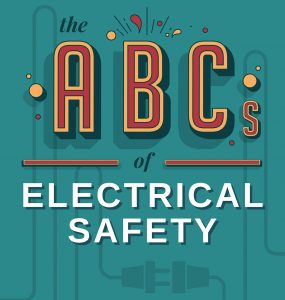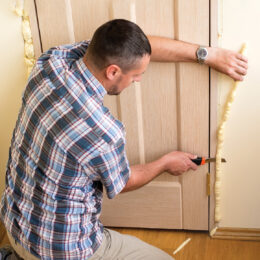 When it comes to power, it’s important to mind your Ps and Qs — and all the other letters of the alphabet!
When it comes to power, it’s important to mind your Ps and Qs — and all the other letters of the alphabet!
Since May is Electrical Safety Month, we thought it was important to review how to stay safe around electricity — letter by letter.
A — APPLIANCE CORDS: Appliance cords should be out of the way — not in the way — of foot traffic. They should also not be under furniture legs or rugs.
B — BEWARE: Beware of places that have “Danger: High Voltage” signs and other warnings on or near them.
C — CLEAN: Keep your workshop and garage clean and dry. Sparks from power tools can ignite wood scraps, sawdust and solvents.
D — DOWEND POWER LINES: If you see a power line that has fallen to the ground, stay away from it.
E — EXTENSION CORDS: They should only be used on a temporary basis and not as permanent household wiring.
F — FRAYED WIRES: They’re dangerous! The wires should be repaired at once by a licensed electrician or, better yet, replaced.
G — GROUND FAULT CIRCUIT INTERRUPTERS: Ground Fault Circuit Interrupters shut off power in time to prevent serious shock. They should be tested monthly.
H — HIT THE GROUND: Although you should seek shelter if you’re caught outside in a lightning storm, if there’s no place in sight, hit the ground. Drop to your knees and bend forward with your hands on your knees. Don’t lie flat on the ground.
I — INSULATORS: Don’t shoot or throw anything at electrical insulators.
J — JUMP: If a car you’re in hits a power line, stay inside the car unless the car catches fire. If it does, jump clear from the car without touching metal and the ground at the same time. Shuffle away keeping both feet on the ground.
K — KITES: Never fly kites near overhead power lines.
L — LADDERS: Make sure ladders, antennas and other tall metal things don’t come in contact with electric lines.
M — METAL: Metal conducts electricity. Therefore, metal objects should not be inserted into an appliance without disconnecting the appliance.
N — NINE-ONE-ONE (911): Call this number immediately if you come across someone who has been shocked or if there is an electrical fire.
O — OVERLOAD: Avoid overloading outlets and never force a plug into an outlet if it doesn’t fit.
P — PLUGS: Don’t pull them from electrical outlets by the cord. Use the gripping area provided on the plugs.
Q — QUICKLY: Act quickly if you see someone who has been shocked. Don’t touch the person if he/she is still in contact with the power source. Unplug the equipment first, then call 911 and the electric cooperative.
R — RESPECT: Respect the power of electricity.
S — SWIMMING POOL: If it starts storming outside, get out of the pool.
T — TREES: Don’t climb them if they are near power lines.
U — UNPLUG: Unplug small electrical appliances if you’re not using them.
V — VANDALISM: Vandalizing power lines or equipment can not only knock out power to homes and businesses, it can also kill or severely injure you.
W — WATER: Water and electricity don’t mix. Don’t leave appliances plugged in where they might come into contact with water. If a plugged-in appliance falls into the water, never reach in to pull it out, even if it is turned off. Unplug it first.
X — EXTINGUISHERS: Make sure your home is equipped with a Class “C” fire extinguisher and smoke detectors.
Y — YOUNGSTERS: Keep an eye out for the youngsters in your home. Put protective covers on outlets within toddlers’ reach.
Z — ZAP: You don’t want to get zapped! That’s why it’s important to be safe around electricity.



